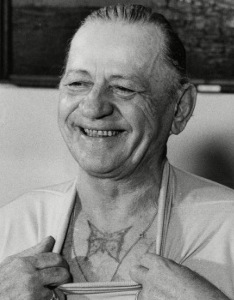Henri Charrière
Henri Charrière (16 November 1906 – 29 July 1973) was a French writer, convicted as a murderer by the French courts, who is best known for his autobiographical novel Papillon. The novel details his alleged experiences of incarceration and escape from the French penal colony of French Guiana, including the notorious Devil's Island. Despite questions about the veracity of his account, Papillon remains a remarkable tale of survival and adventure that has captivated readers worldwide.
Early Life[edit | edit source]
Henri Charrière was born in Saint-Étienne-de-Lugdarès, Ardèche, France. Little is known about his early life before his incarceration, other than he moved to Paris as a young man, where he became involved in petty crime.
Criminal Conviction[edit | edit source]
In 1931, Charrière was convicted of the murder of a Parisian pimp named Roland Le Petit, a charge he always denied. He was sentenced to life imprisonment and sent to the French penal colony in French Guiana, a system of prisons infamous for its harsh conditions and the brutality of its guards.
Life in the Penal Colony[edit | edit source]
Upon arrival in French Guiana, Charrière was subjected to the severe conditions of the penal system. He made numerous escape attempts, the first of which occurred only a few months after his arrival. His book, Papillon, describes in detail the trials and tribulations he faced, including solitary confinement, disease, and the constant threat of death.
Escape to Freedom[edit | edit source]
Charrière's most famous escape attempt, and the one that eventually led to his freedom, involved using a sack of coconuts as a makeshift raft to float away from the island. After several days at sea, he was rescued and eventually made his way to Venezuela, where he lived for the rest of his life.
Later Life and Papillon[edit | edit source]
In Venezuela, Charrière settled down and wrote Papillon, published in 1969. The book was an immediate bestseller and has since been translated into multiple languages. It was later adapted into a successful Hollywood film in 1973, starring Steve McQueen as Charrière and Dustin Hoffman as his fellow inmate, Louis Dega.
Death[edit | edit source]
Henri Charrière died of throat cancer on 29 July 1973 in Madrid, Spain. He was 66 years old. Despite the controversies surrounding the accuracy of his book, Charrière's legacy as a symbol of the indomitable human spirit to overcome adversity and seek freedom remains strong.
Legacy[edit | edit source]
The debate over the factual accuracy of Papillon continues, with some critics and historians suggesting that Charrière may have embellished or borrowed experiences of other inmates. However, the book's impact as a powerful narrative of human resilience and the will to achieve freedom is undisputed.
See Also[edit | edit source]
Search WikiMD
Ad.Tired of being Overweight? Try W8MD's physician weight loss program.
Semaglutide (Ozempic / Wegovy and Tirzepatide (Mounjaro / Zepbound) available.
Advertise on WikiMD
|
WikiMD's Wellness Encyclopedia |
| Let Food Be Thy Medicine Medicine Thy Food - Hippocrates |
Translate this page: - East Asian
中文,
日本,
한국어,
South Asian
हिन्दी,
தமிழ்,
తెలుగు,
Urdu,
ಕನ್ನಡ,
Southeast Asian
Indonesian,
Vietnamese,
Thai,
မြန်မာဘာသာ,
বাংলা
European
español,
Deutsch,
français,
Greek,
português do Brasil,
polski,
română,
русский,
Nederlands,
norsk,
svenska,
suomi,
Italian
Middle Eastern & African
عربى,
Turkish,
Persian,
Hebrew,
Afrikaans,
isiZulu,
Kiswahili,
Other
Bulgarian,
Hungarian,
Czech,
Swedish,
മലയാളം,
मराठी,
ਪੰਜਾਬੀ,
ગુજરાતી,
Portuguese,
Ukrainian
Medical Disclaimer: WikiMD is not a substitute for professional medical advice. The information on WikiMD is provided as an information resource only, may be incorrect, outdated or misleading, and is not to be used or relied on for any diagnostic or treatment purposes. Please consult your health care provider before making any healthcare decisions or for guidance about a specific medical condition. WikiMD expressly disclaims responsibility, and shall have no liability, for any damages, loss, injury, or liability whatsoever suffered as a result of your reliance on the information contained in this site. By visiting this site you agree to the foregoing terms and conditions, which may from time to time be changed or supplemented by WikiMD. If you do not agree to the foregoing terms and conditions, you should not enter or use this site. See full disclaimer.
Credits:Most images are courtesy of Wikimedia commons, and templates Wikipedia, licensed under CC BY SA or similar.
Contributors: Prab R. Tumpati, MD

